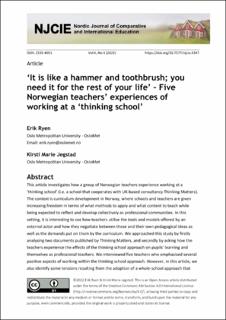| dc.contributor.author | Ryen, Erik | |
| dc.contributor.author | Jegstad, Kirsti Marie | |
| dc.coverage.spatial | Norway | en_US |
| dc.date.accessioned | 2022-05-25T08:29:32Z | |
| dc.date.available | 2022-05-25T08:29:32Z | |
| dc.date.created | 2022-02-18T20:49:41Z | |
| dc.date.issued | 2022-02-05 | |
| dc.identifier.issn | 2535-4051 | |
| dc.identifier.uri | https://hdl.handle.net/11250/2996142 | |
| dc.description.abstract | This article investigates how a group of Norwegian teachers experience working at a ‘thinking school’ (i.e. a school that cooperates with UK-based consultancy Thinking Matters). The context is curriculum development in Norway, where schools and teachers are given increasing freedom in terms of what methods to apply and what content to teach while being expected to reflect and develop collectively as professional communities. In this setting, it is interesting to see how teachers utilise the tools and models offered by an external actor and how they negotiate between these and their own pedagogical ideas as well as the demands put on them by the curriculum. We approached this study by firstly analysing two documents published by Thinking Matters, and secondly by asking how the teachers experience the effects of the thinking school approach on pupils’ learning and themselves as professional teachers. We interviewed five teachers who emphasised several positive aspects of working within the thinking school approach. However, in this article, we also identify some tensions resulting from the adoption of a whole-school approach that emphasises the methods that teachers should use and that pupils should master as a way of achieving the overarching aims of the curriculum. | en_US |
| dc.language.iso | eng | en_US |
| dc.publisher | OsloMet - Storbyuniversitetet | en_US |
| dc.relation.ispartofseries | Nordic Journal of Comparative and International Education (NJCIE);Vol. 6 No. 1 (2022) | |
| dc.rights | Navngivelse 4.0 Internasjonal | * |
| dc.rights.uri | http://creativecommons.org/licenses/by/4.0/deed.no | * |
| dc.subject | Thinking school approaches | en_US |
| dc.subject | Pupils’ learning | en_US |
| dc.subject | Teachers as professionals | en_US |
| dc.subject | Teachers | en_US |
| dc.title | ‘It is like a hammer and toothbrush; you need it for the rest of your life’ – Five Norwegian teachers’ experiences of working at a ‘thinking school’ | en_US |
| dc.type | Peer reviewed | en_US |
| dc.type | Journal article | en_US |
| dc.description.version | publishedVersion | en_US |
| dc.rights.holder | © 2022 Erik Ryen & Kirsti Marie Jegstad | en_US |
| cristin.ispublished | true | |
| cristin.fulltext | original | |
| cristin.qualitycode | 1 | |
| dc.identifier.doi | https://doi.org/10.7577/njcie.4347 | |
| dc.identifier.cristin | 2003550 | |
| dc.source.journal | Nordic Journal of Comparative and International Education (NJCIE) | en_US |
| dc.source.volume | 6 | en_US |
| dc.source.issue | 1 | en_US |
| dc.source.pagenumber | 1-18 | en_US |

